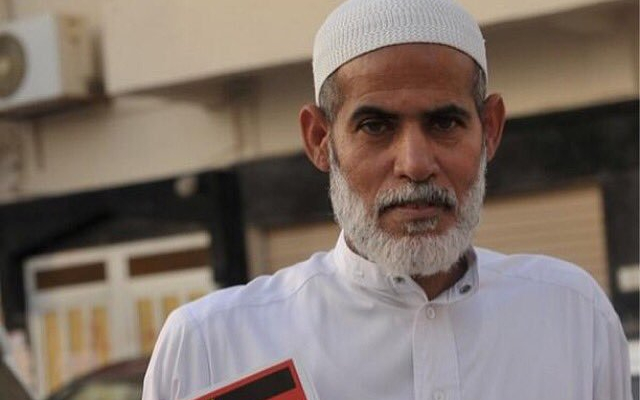AbdulHadi Saleh AlMeshaimea is a 54-year-old Bahraini and the father of Ali AlMeshaimea, who was shot and killed by riot police in 2011. AbdulHadi was one of ten individuals arrested on 12 October 2018 prior to a march in protest of the upcoming Parliamentary elections. Among the others arrested was Sayed Saeed Isa, the father of Sayed Hashem, who was also killed by Bahraini forces in 2011. Both AbdulHadi and Sayed Saeed were targeted for their participation in demonstrations and for speaking publicly about their sons’ deaths. While he was detained, authorities denied AbdulHadi medical treatment and subjected him to unfair trial proceedings.
On 12 October 2018, officers in plain clothing arrested AbdulHadi and ten other individuals in the area who were gathered prior to a march. They were arrested on the charge of illegal assembly, though AbdulHadi maintains that he was at a market in the area, and did not intend to participate. Officers threatened and intimidated AbdulHadi on the way to the Al-Budaiya police station, where they interrogated him for two hours without a lawyer present. AbdulHadi was then transferred to the Northern Governorate Police Directorate and detained for two days. On 14 October 2018 at 9:00 am, AbdulHadi was taken to the Office of Public Prosecution (OPP), where he was interrogated again without his lawyer present and threatened with violence. The OPP decided to detain AbdulHadi for 15 days at Dry Dock Detention Center, a period which they later extended for a further 15 days.
On 15 November 2018, officers took AbdulHadi to the High Civil Court without previously informing him that he had a court session scheduled, leaving him unprepared for the proceedings. The prosecution presented a photograph they alleged showed AbdulHadi’s side profile in the crowd, a claim he denied, and the judge ordered AbdulHadi’s release on bail without dropping the charges. Since the initial court session, AbdulHadi’s hearing has been postponed several times. He most recently attended the Court on 19 December 2018, and he expects his verdict at the next hearing.
During his detention at Dry Dock, AbdulHadi requested his medications for hypoglycemia. However, the authorities deprived him of these medications and on 4 November 2018, AbdulHadi experienced a drop in his blood sugar levels, resulting in a lack of awareness of those around him, anxiety, irritability, and fainting. He also suffered four seizures, posing a great risk to his life. AbdulHadi’s deteriorating condition is due to his lack of access to medication, in addition to the prison meals which do not meet the needs of the diet he must follow for medical reasons. Despite AbdulHadi’s critical condition, and several complaints, no action was taken on his case.
As AbdulHadi was denied access to his lawyer and was not provided with adequate time and facilities to prepare for trial, Bahrain’s government has violated AbdulHadi’s fundamental human rights under international law as delineated in multiple treaties to which it is party, including the International Covenant on Civil and Political Rights (ICCPR), the Universal Declaration of Human Rights (UDHR), and the International Covenant on Economic, Social and Cultural Rights (ICESCR), which contain provisions against unfair trials. The Bahraini authorities have additionally failed to provide AbdulHadi with necessary medical treatment, and as such have failed to meet the standards for conditions of detention in the United Nations Standard Minimum Rules for the Treatment of Prisoners (Mandela Rules). In light of these abuses, Americans for Democracy & Human Rights in Bahrain (ADHRB) calls for AbdulHadi’s redress for past suffering, and if criminal charges can be sustained against him, for a fair trial in accordance with international juridical standards.





